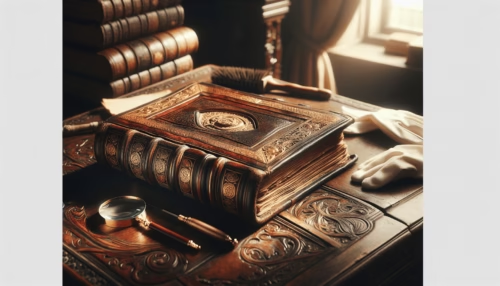Have you ever considered the intricate allure and profound intellectual satisfaction that comes with the collection and preservation of rare books? In an era where digitalization seems to overshadow the tactile pleasure of leafing through an old book, the appreciation for rare book collections has experienced a renaissance of sorts. As a field, it navigates between art, history, and meticulous care, demanding a balance of these worlds to maintain the integrity of these cultural artifacts. This art and science of safeguarding volumes often older than us provides a fascinating dive into both historical preservation and personal dedication.

Table of Contents
Understanding Rare Books and Their Value
What Constitutes a Rare Book?
The definition of a rare book often eludes a straightforward explanation. Rare books are typically defined by their scarcity, historical and cultural significance, and the uniqueness of their physical attributes. These factors contribute significantly to the book’s value, making them items of interest for serious collectors, historians, and literary enthusiasts alike. A first edition “Moby Dick” or a manuscript bound in a unique leather cover can spark intense interest and offer priceless windows into historical contexts.
The Historical Weight of Rare Books
Rare books serve not just as carriers of text, but as historical documents that offer insights into the times they originate from. Each book carries with it stories beyond its written words, including the conditions of its creation, its previous owners, and its journey across time. This richness provides invaluable context and can profoundly impact a collector’s decision to acquire a particular piece.
Basic Steps in Starting a Collection
Identifying Personal Interests
The journey into rare book collecting begins with the individual’s interests. A collector might gravitate towards a specific genre, author, or historical period, which helps guide their acquisitions and offers a personal connection to their collection. Whether it be Victorian literature, first editions of American classics, or ancient manuscripts, the beauty of rare book collecting lies in its broad spectrum.
Budgeting and Assessing the Market
Rare books can range drastically in price, influenced by rarity, condition, demand, and provenance. Before venturing into this domain, aspiring collectors should acquaint themselves with the market trends and set realistic budgetary boundaries. Platforms like rare book auctions, estate sales, and specialized dealers can serve as starting points for obtaining books within one’s financial range.

Key Considerations in Rare Book Preservation
Environmental Factors
The longevity of a rare book hinges significantly on its surrounding environment. Key factors to consider include temperature, humidity, and light exposure. Optimal conditions generally entail a temperature range of 60 to 70°F with relative humidity levels between 30% and 50%. Direct sunlight, being particularly harmful, should be avoided to prevent fading and deterioration of book covers and pages.
Storage Practices
Proper storage practices are paramount in preserving the condition of rare books. Books should be stored upright, supported by bookends if necessary, and never packed too tightly. Attention should be paid to the materials used in shelving; avoiding acidic woods and opting for treated or metal shelving can prevent damage from chemical leaching.
Handling Techniques
Handling rare books with care is crucial to maintaining their condition over time. Clean, dry hands are a must, or preferably, white cotton gloves can be used to prevent oils from fingers transferring onto the pages. Moreover, supporting the spine and using bookmarks instead of folding pages help mitigate physical stress to the book structure.
The Importance of Provenance and Documentation
Tracing the Book’s History
The provenance of a book can add significant value and interest. This history traces the ownership of the book, often enriching its narrative. Books with notable previous owners or those that played parts in historical events often gain increased value and recognition. A documented history can transform a book from simply being a printed artifact to a historical treasure.
Cataloging and Documentation
Careful documentation of the collection, including purchase records, care logs, and provenance, assists collectors in keeping track of their acquisitions. Detailed records support insurance processes and help maintain a structured and informative catalog that can serve future appraisers or collectors.

Examining Case Studies in Rare Book Collection
The Gutenberg Bible
One of the most illustrious rare books, the Gutenberg Bible, is undoubtedly an exemplary case study in book collecting. Its historical significance as the first major book printed using movable type technology highlights its monumental role in the democratization of knowledge. Collectors and institutions highly prize copies of the Gutenberg for their historical, cultural, and technological value.
The First Folio of Shakespeare
Another famed case is the First Folio of Shakespeare, crucial for preserving many of Shakespeare’s works that might have otherwise been lost. Its scarcity and the deep cultural value attached render it a centerpiece in literary collections. Collectors prize any opportunity to obtain such monumental literary artifacts due to their significant contribution to literary history.
Legal and Ethical Considerations in Rare Book Collecting
Provenance and Legality
The legality surrounding the acquisition of rare books can be complex, especially when it concerns artifacts with international significance. Laws regarding cultural heritage protection necessitate due diligence in verifying the legality of purchasing and owning such treasures. Ensuring that books have clear and legal provenance documentation is essential to prevent legal disputes and ethical dilemmas.
Ethical Considerations
Collectors should be mindful of ethical considerations, such as the impact of their acquisitions on cultural heritage and public accessibility. The privatization of culturally significant books can limit scholarly access and public appreciation, so some collectors opt to donate or lend items to institutions to enrich cultural and educational resources.

Future Trends in Rare Book Collecting and Preservation
Digital Preservation Techniques
As technology evolves, digital techniques have started playing roles in preservation strategies. High-quality digitization allows collectors and institutions to mitigate handling risks while providing broader access to the content of rare books. This trend increases accessibility while ensuring the physical copies remain well-preserved.
Influences of Artificial Intelligence
Artificial intelligence is beginning to influence rare book collection by facilitating provenance research and predictive analysis of book conditions. AI can assist collectors in making informed decisions about acquisitions and preservation strategies, thus enhancing the accessibility and value of rare book collections.
Conclusion: Embracing the Legacy of Rare Books
The practice of collecting and preserving rare books remains an engaging, intellectually fulfilling pursuit that connects modern individuals to historical legacies. By maintaining informed, ethical, and diligent collection and preservation practices, collectors contribute to sustaining cultural heritage for future generations. Those who embark on this journey discover not only a rewarding personal pastime but also a pathway for preserving human knowledge and art. So, as the pages of our digital age turn ever faster, the world of rare book collection persists as a sanctuary for those who revel in the timeless tales contained within bound paper.
By examining all these facets—the historical significance, preservation techniques, and ethical considerations—collectors can enrich both personal and communal connections to human culture and history through the safeguarding of rare books. In this pursuit, they become keepers of a tangible bridge to the past, ensuring that the whispers of history continue to be heard in the resonance of printed words.


